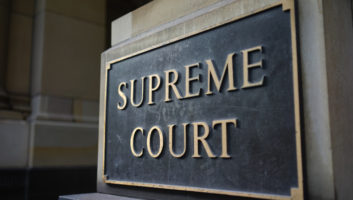
A unanimous decision by the U. S. Supreme Court justices on Thursday allows the FCC to ease limits on the ownership of local radio and television. Legal observers believe the court’s decision in essence reinstates the FCC’s 2017 media ownership rules.
The FCC adopted rules to abolish the ban on newspaper/broadcast and radio/TV cross ownership, and relax several local TV ownership regulations in 2017. Those new rules were held up from taking effect for years due to court challenges that have now been exhausted, experts say.
Legal experts believe the “practical result” of the high court’s decision is that the FCC’s media ownership rules adopted in 2017 will simply go into effect now, said Matt McCormick, co-managing member at Fletcher, Heald & Hildreth.
[Read: Supreme Court Rules on Media Ownership Question]
“The Supreme Court’s ruling supports the authority of the FCC and other administrative agencies to make reasonable predictive judgments, even on sparse record evidence,” McCormick says.
The FCC is currently split 2–2 along party lines and is under new leadership of acting chair Democrat Jessica Rosenworcel. It’s not clear if commissioners will discuss the top court’s decision at its April open meeting. A tentative agenda for the meeting on April 22 does not mention it. The meeting agenda could obviously be updated going forward, legal observers say.
Rosenworcel voted against the ownership rule changes in 2017 and again made her feelings known with a released statement following the SCOTUS announcement: “While I am disappointed by the court’s decision, the values that have long upheld our media policies — competition, localism, and diversity — remain strong. I am committed to ensuring that these principles guide this agency as we move forward.”
Meanwhile, Republican FCC commissioner Brendan Carr yesterday reinforced his belief that the 2017 rule changes made were common sense. “(Thursday’s) unanimous opinion from the U.S. Supreme Court leaves no doubt that the FCC’s modern approach to media regulation that we adopted in 2017 was the right decision.”
Scott Flick, a communications attorney at Pillsbury, wrote on social media that he believes Thursday’s SCOTUS ruling could mean even bigger changes to media ownership in this country. He published his thoughts on the CommLawCenter blog: “It will not end the debate over the FCC’s various broadcast ownership rules, but will certainly change the nature of that debate, and open the door to a different debate — whether broadcast ownership rules are needed at all.”
The commission also could now consider changes to local radio ownership rules. The FCC had paused discussion of changes to the radio ownership rules in 2018 at the start of a new ownership review period. NAB at the time suggested significant changes to the FCC rules limiting the number of terrestrial radio stations that one company can own in a radio market.
Current radio market caps were set in 1996 as part of that year’s Telecommunications Act. It placed limits on a sliding scale. In the largest of radio markets an entity can own up to eight radio stations (only five of which can be of the same service), and in the smallest markets, only two stations (one AM and one FM).
Radio World has reported NAB pushed for changes to market subcaps to allow a company to own up to eight FMs in the top 75 markets while also permitting the operator to own or control a limitless number of AM stations among other changes. Ownership caps are the total number of stations you can own in a market, whereas as a subcap is how many of those stations can be FM or AM.
David Oxenford at Wilkinson Barker Knauer wrote on his Broadcast Law Blog on Thursday: “Now that the Third Circuit’s reasoning has been rejected, that still does not mean that the FCC, particularly a Democrat-controlled FCC, will automatically look to relax the radio rule.
“Instead, we think it likely that the commission will ask for more comments on the issues raised in the 2018 proceeding. This will likely include a request to discuss the impact of the Supreme Court decision on the commission’s evaluation of proposed changes to its rules. It would not be surprising for the FCC to also ask for an update of the comments filed in 2019 to reflect the state of current marketplace. In other words, any change in the radio ownership rules will not come quickly.”
The National Association of Broadcasters, which joined the FCC in fighting the lower court ruling blocking changes to broadcast media ownership regulation, said it remains critical the commission continues to examine its media ownership rules to ensure that America’s broadcasters are able to compete. The group’s President and CEO Gordon Smith issued this statement.
“NAB commends (the) unanimous decision by the Supreme Court that the FCC’s recent and long-overdue modernization of its broadcast ownership regulations was lawful and appropriate. We look forward to working with the commission on this effort given the essential role radio and television broadcasters play for all Americans.”
"Media" - Google News
April 03, 2021 at 04:11AM
https://ift.tt/3ucvmWw
Top Court's Ruling Reinstates Media Ownership Changes - Radio World
"Media" - Google News
https://ift.tt/2ybSA8a
https://ift.tt/2WhuDnP
Bagikan Berita Ini














0 Response to "Top Court's Ruling Reinstates Media Ownership Changes - Radio World"
Post a Comment